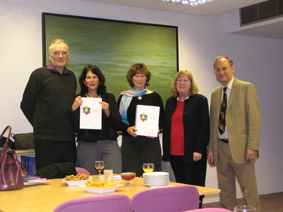How many teenagers love studying science or reading scientific papers and texts? Probably very few, since most youngsters find subjects like chemistry and physics daunting, even intimidating. A Weizmann Institute educational program that fosters skills for tackling scientific topics in secondary school students is currently being introduced in England.
Entitled "Learning Skills for Science," it teaches youngsters how to find their way through the vast ocean of scientific knowledge. "If you throw non-swimmers into deep water, only a lucky few will figure out how to stay afloat - most will drown. But if you first teach these people how to swim, they will all survive!" says Dr. Zahava Scherz of the Institute’s Science Teaching Department.
"Learning Skills for Science" provides youngsters with challenging yet fun tasks designed to teach them how to find, critically evaluate and present information in order to increase their scientific knowledge. For example, they learn how to take notes in a lecture, evaluate the reliability of a website, interpret data in a diagram or table, prepare a presentation and make good judgments about the quality of an article on the basis of a quick reading. In this last activity, students are taught browsing skills that help them answer questions about a six-page scientific article after reading it for only five minutes.
Scherz originally developed the program in the late 1990s with Dr. Ornit Spektor-Levy, at the time a Ph.D. student, as part of the MATMON science education project headed by the Weizmann Institute’s Prof. Bat-Sheva Eylon and sponsored by the Israel Ministry of Education, Culture and Sport. The program has now been expanded, updated and adapted to the needs of the British education system, with the support of a grant awarded to Eylon and Scherz by the Gatsby Science Enhancement Programme (SEP), one of the Sainsbury Family Charitable Trusts. The learning and teaching materials have been published in collaboration with the prestigious Nuffield Curriculum Centre, which has supported the development of innovative science curricula in the United Kingdom for more than 40 years.
According to Sally Johnson, project manager for SEP, "Learning Skills for Science" fits well with the new approach to teaching science in British high schools - particularly the "Twenty First Century Science" syllabus - which seeks to increase public understanding of science by getting children involved in how science and scientists work. New courses along these lines currently introduced in British high schools stress skills as well as content in science education, and "Learning Skills for Science" is seen as a helpful preparation for students following the new curriculum. Johnson adds that "teachers who are going through the 'Learning Skills for Science' training have greeted the program with enthusiasm."
Scherz and Spektor-Levy have conducted a number of workshops at the University of London and elsewhere in England over the past two years, both for teachers and for trainers of the teachers in the program. About 100 teachers are presently being trained, and in June-July 2006, at the end of the current school year, the program will enter a further pilot stage in which it will be taught to ninth-graders in 75 schools throughout England. After the pilot has been evaluated, the organizers hope to distribute the program more widely in the United Kingdom. Considerable interest has also been expressed by science teaching experts in other countries, such as India, Ireland, the Netherlands and South Africa.
Summing up the objectives of the program, Scherz says: "Today, people have access to knowledge not just through their teachers but through a variety of other sources. The 'Learning Skills for Science' program offers school students a way to develop the skills for life-long independent learning."
Prof. Bat-Sheva Eylon's research is supported by the Gerald and Daphna Cramer Family Foundation. Prof. Eylon is the incumbent of the Chief Justice Bora Laskin Professorial Chair of Science Teaching.
Innovation for Teachers
The collaboration with the British education system is further fostered through an additional grant, awarded by SEP to Profs. Bat-Sheva Eylon and Avi Hofstein of the Institute’s Science Teaching Department. This project, carried out with King’s College, London, is aimed at designing innovative programs for the continuing professional development of science teachers.
Field Study
Three years ago the management of the "Nirim" youth village in northern Israel turned to the Weizmann Institute's Prof. Nir Orion for assistance. Founded by ex-naval commandos wishing to contribute to society, "Nirim" enrolls boys and girls who have dropped out of school; one of its goals is to help its students graduate from high school with a full matriculation certificate, which requires passing several exams, including an extended in-depth exam in one subject. The village's management hoped that a special outdoor teaching program in the earth sciences developed by Orion and his team in the Institute's Science Teaching Department would enable the boys and girls to meet the in-depth examination requirement.
Inspired by the challenge, Orion and his team have been putting in dozens of work days at "Nirim" on a volunteer basis over the past three years. The results weren't long in coming. Barely six months after the new program had been introduced, one group of students passed a field matriculation exam in the earth sciences with an average of 94.5; and after two years, all the students passed all the matriculation exams in this subject with flying colors.
The secret of the program's success lies in its relevance to the "real" world, as some youngsters drop out of school because they find classroom study boring and irrelevant to their lives. The program involves at least 12 field trips throughout Israel and focuses on environmental concepts pertinent to daily living. Says Orion: "This approach is amazingly simple and incredibly effective. All it requires is that the learning take place through a concrete interaction with the real world outside the classroom."

 Prof. Nir Orion%2C Tamar Basis%2C Carmit Cohen and Yossi Gudovitch. Science teaching gets real.jpg)